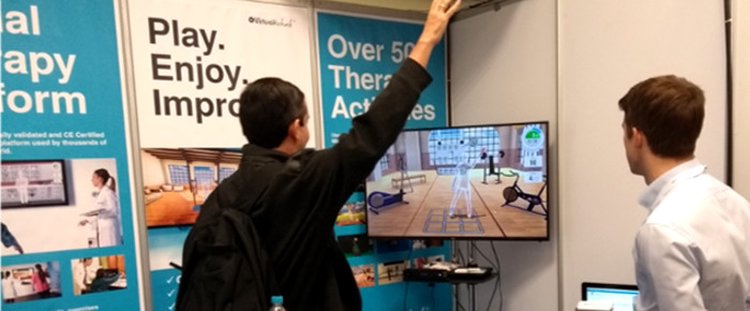
Virtualware exhibits at another highly successful RehabWeek, presenting the new updates to VirtualRehab including a Motor and Language Training module and a VR app for ADL training.
Having already presented the latest version of VirtualRehab, Virtualware’s CE marked motor neurorehabilitation platform, at the 5th Annual Queen Square upper Limb neurorehabilitation course in London and at the Ineba Conference in Buenos Aires in Argentina, the next event to demonstrate all the latest features of VirtualRehab was at RehabWeek in London.
The latest edition of RehabWeek took place from July 17 to 23 at the QE II Congress Centre in central London. This biannual international meeting brings together researchers and clinicians working in rehabilitation technologies including FES, robotics and virtual reality. This year’s edition included an impressive series of keynote lectures by speakers from around the world, sessions, panel discussions and poster sessions.
As part of the scientific program, Virtualware participated in a workshop organized by WFNR and IISART on Wednesday, July 17th entitled “Advanced Technologies in Neurorehabilitation”, where national and international experts in the field of rehabilitation took part, visiting the stands of different companies to see first-hand how different technologies, like VirtualRehab, are being used to help improve neurorehabilitation.
Visitors to the Virtualware stand had the chance to test out all the new features of VirtualRehab 4.0, both in the BODY and HANDS modules, as well as see the new Motor and Language Training (MaLT) module which Virtualware is currently building in conjunction with The Department of Clinical Language Sciences at the University of Reading (UK). This combined motor and language therapy tool for brain injury patients uses the Kinect and includes games that target major language therapy tasks involving single word comprehension, initial phoneme identification, rhyme identification and naming of objects.
Based on the University of Reading’s initial studies, MaLT has demonstrated that motion sensor technology can be successfully combined with a language therapy task to target both upper limb and linguistic impairment in patients following brain injury. This new module reflects VirtualRehab’s multidisciplinary approach to providing virtual rehabilitation in clinical and home settings.
Visitors to the stand were also able to try another exciting interactive rehabilitation solution currently being developed by Virtualware which uses the HTC Vive Virtual Reality headset. The new application is focussed on training Activities of Daily Living, including preparing meals and shopping for groceries, in a fully immersive environment. The VR app is designed to be used as an intervention for ‘action disorganised syndrome’, a common neurological impairment associated with damage to the frontal lobes in the brain.
When donning the HTC VR headset, the user finds themselves in a kitchen environment where they have a virtual assistant in the form of a small robot. The user can then choose from a series of menus to prepare, and are then required to perform all the tasks to make the meal. This includes finding all the necessary items in different parts of the kitchen (fridge, cupboards, etc.).
In the case that there are any missing ingredients, the user is then ‘transported’ to a supermarket where they are required to find the missing items on the shelves. They then need to pay for the items, after which they are transported back to their kitchen. The user then must ‘cook’ the meal on the stove by choosing the ingredients in the right order.
This highly engaging application was a real success with all visitors to the stand, with many people passing by the stand just to test it having heard about the application from other attendees. The very positive feedback show how VR is growing in its acceptance as a new tool to improve rehabilitation.
David Fried, the International Business Development Director for VirtualRehab said of RehabWeek 2017: “We are very pleased with the results from this year’s edition. As usual, the impressive level of the speakers and the talks was an important draw for rehabilitation professionals from around the world, which also makes it the perfect venue for showing VirtualRehab. We received an excellent response on the new version of VirtualRehab, and our VR app for ADL training was a huge success. As a result of the event, we are already in discussions with new clients and distributors around the globe, which really proves the strength of RehabWeek for both companies and those who form part of the rehabilitation field. We’re definitely looking forward to attending the event in Toronto in 2019.”